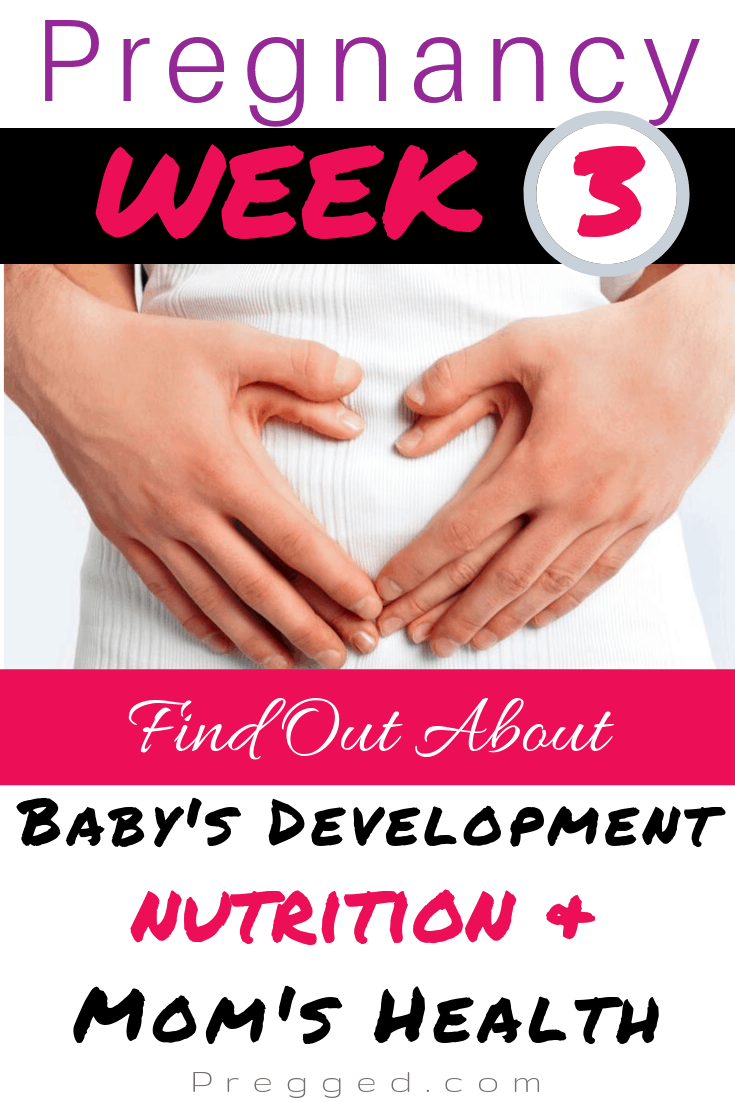
Welcome to the Pregged pregnancy week-by-week series. Each week-by-week post is separated into three handy sections.
1. Mom – Section one covers the changes mom will experience and the things she may need to consider health-wise.
2. Baby – Section two looks at the development of the fetus and what’s going on with baby inside the womb.
3. Nutrition – Section three covers nutrition for each week of pregnancy so that you know what foods are important to include in your diet at each stage.
3 Weeks Pregnant – Mom
Voila! Here we are at week three. This is the fateful week that determines whether you will become a newly pregnant Mom-to-be.
Slowly and deliberately, the blastocyst is propelled towards the uterus, where it will find a comfy spot to dig in for another 37 weeks or so.
When the blastocyst cells have multiplied so it becomes an embryo, it hooks up to Mom’s uterine blood supply. Embryos are barely visible to the naked eye—about the size of a Kiwi seed.
The cells start to become different types depending on the type of organ it will become.
The early placenta starts to form that allows the embryo to grow via its attachment to the umbilical cord that comes out of the tiny baby’s belly button area.
Some women will experience light bleeding or spotting during implantation which is known as implantation bleeding, but don’t be alarmed unless it is heavy.

Baby Development Week 3
How does the zygote (the fertilized egg) get to its permanent home inside the uterus? It’s a treacherous journey which depends on a transport system known as the Fallopian tube.
Through a series of wavelike motions, the zygote goes up and down as it travels and grows in preparation for burrowing into the soft, nutrient dense uterus.
There, it implants and becomes a blastocyst which is about 200 cells, and a microscopic 0.1-.2mm in size.
The zygote may prematurely implant in an unusual place such as the Fallopian tube causing an ectopic pregnancy, but this is not common unless there has been damage to the tube in the past.
The blastocyst ultimately becomes an embryo, with a placenta and amniotic sac that is the baby’s home for the rest of the pregnancy.
The beginning of the placenta comes from the blastocyst, known as the trophoblast.
The placenta is the source of a blood supply for the fetus that is delivered via the umbilical cord.
The umbilical cord isn’t quite developed yet, but when it is, it sends waste back to the mother’s blood for disposal; while the nutrients come from the mother’s blood and are transferred from the placenta to the baby via the umbilical cord.
The entire process of implantation requires enzymes and growth factors such as human chorionic gonadotropin (HCG), which can be measured in a home pregnancy test. HCG is the hormone that causes the magical plus sign on your test.
It’s unlikely that a test would pick up enough HCG at this point; but wait another week and you might just see that positive.
Nutrition for Week 3 of Pregnancy
This week your future baby can finally begin to grow in your body! Food can help support the conception and early growth of an embryo. If you haven’t started prenatal vitamins, now is the time to do so.
Be sure you’re getting enough Calcium (three servings a day) as studies show it may boost your ability to conceive. You can find this vital bone-protector in dairy products, fortified juices, broccoli, leafy green vegetables, sesame seeds, and canned salmon.
The second mineral you need is Manganese (about 2 mg a day). It is essential for proper reproductive function. Carrots, broccoli, whole grains, nuts, bananas, spinach, and raisins are all excellent sources of manganese.
Zinc is crucial for conception — in fact, severe deficiencies can impair fertility.
You can take a 15-20 mg zinc supplement each day. Or take care to consume meats, almonds, beans, yogurt, oatmeal, corn, eggs, fortified pieces of bread and cereals, and cooked shellfish to up your intake of zinc without a supplement.
Fiber is found in fruits, vegetables, legumes, and whole grains, and is essential for your health.
Importantly, it prevents or eases constipation, a common pregnancy complaint that can lead to hemorrhoids. The goal is 25 to 35 milligrams of fiber per day.
Avoid excessive caffeine (more than two cups of coffee a day) and alcohol.
Be aware that some foods, including chocolate and ice cream, often include caffeine; so take them into account when you’re calculating your daily intake. Sugary, caffeinated soda should also be avoided.
Many herbal supplements and teas are known for enhanced fertility, but it’s still too early to tell how effective and safe they are. So be cautious with supplements and check with your healthcare practitioner before you take them.
Sources:
1. https://www.healthline.com/health-news/here-are-5-nutrients-that-can-help-women-get-pregnant
2. https://www.babycenter.com/3-weeks-pregnant
